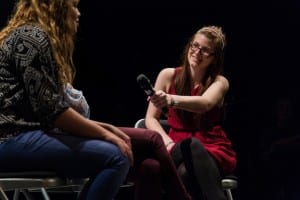
Verbatim theatre along with documentary theatre has become increasingly popular over the last twenty years. The central concept of verbatim is that you put the real words of real people on stage as near as possible to how they were spoken. Some of the first works of verbatim theatre to gain notoriety include Richard Norton-Taylor’s The Colour of Justice which used the court records to recreate key moments in the Stephen Lawrence murder trial. The Colour of Justice has since become very influential and many agree played some part in the inquiry and the Macpherson report that followed. The playwright Robin Soans has said that a certain amount of expectations have built up around Verbatim theatre and that an audience “will expect the play to be political” (Soans in Hammond and Stewart, 2010, 19) in the last few years however many have challenged this preconception and shown that verbatim can be more about the people than the politics.
Alecky Blythe wrote The Girlfriend Experience about the way prostitution works in modern Britain and while it was partly political it was made far more remarkable by the people and their real lives being displayed as they never have been before. Her next play was to eradicate politics almost completely London Road was about a community recovering from finding a murderer in their midst. Breaking the mould once more London Road is the first verbatim musical and this seems to indicate that Verbatim has lost it’s sacred status and that it is open more to poetic licence and experimentation.
In the above clip a range of verbatim writers talk about the balance to be struck between representing the interviewee and creating good theatre. Alecky Blythe expresses how she finds herself taking bigger leaps in poetic licence as her career has gone on. London Road as a play is the closest to Three Words of any verbatim play I’ve read because it concerns itself only with the people, what they do, and how they feel. It is verbatim used to bring new voices and perspectives into the theatre, it puts the humanity of its characters on display to the audience.
This too is what we wanted, people will always be at the centre of Three Words and we needed to inject a healthy dose of reality to ensure we were not making exactly the kind romance that Hollywood seems to incapable of escaping. That was when we made our decision to find as many interviewees and use their stories as the backbone of the show. We use verbatim in several places, much of it recorded, here is one piece that made it without any editing into the show.
In other places we have had to do as Alecky Blythe has done and edit, merge or downright invent stories for the purposes of making the show easy to follow. ‘The 2p Train’ was a based on a story from within the company and one from outside, we spoke to the outside party and presented them with our script for their confirmation. This type of merging is mentioned in the above video by the director Nadia Fall and it is commonly used in order to simplify the amount of characters the audience has to follow. As we only really had two characters throughout the show a lot of merging took place but always with the express consent of those we spoke to.
The clip above shows that Verbatim has lost some of the puritanical attention to detail that companies like Blythe’s Recorded Delivery developed in favour of something a little more theatrical. It has past the point of being simply political in the way that it was for writers like David Hare and Robin Soans. Verbatim is developing into more than a set of rules into another tool for storytellers to use. It brings people into the theatre that would never normally cross the threshold let alone step on stage and celebrates their stories. Verbatim is really the only way to truly represent people and that’s what Three Words is all about.
Works Cited
Blythe, A (2011) London Road. London: Nick Hern Books.
Blythe, A (2008) The Girlfriend Experience. London: Nick Hern Books.
Hammond, W & Steward, D. (eds.) (2010) Verbatim Verbatim. London: Oberon Books.
National Theatre (2014) The ethics of verbatim theatre. [online video] Available from https://www.youtube.com/watch?v=39JSv-n W5U [accessed 4 May 2014].
Norten-Taylor, R. (1999) The Colour of Justice. London: Oberon Books.